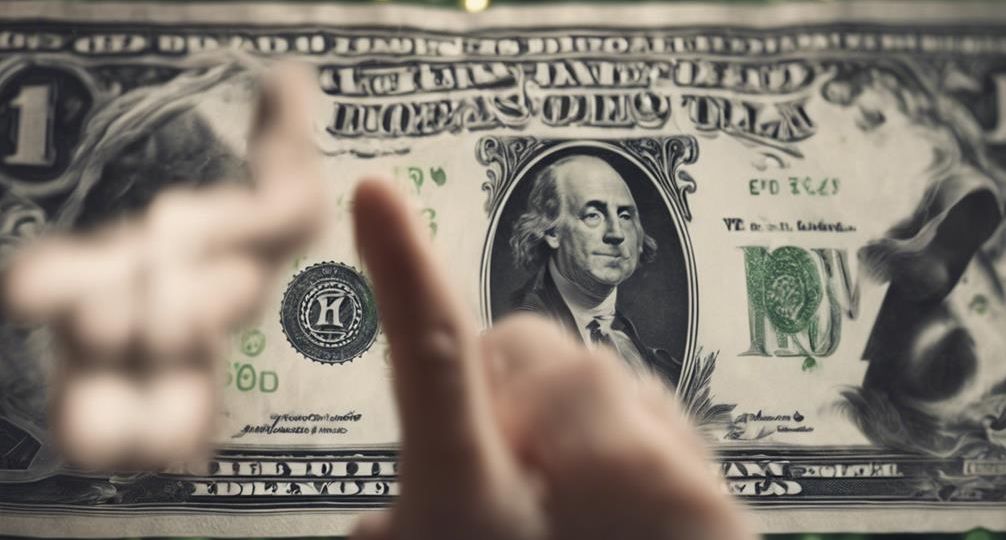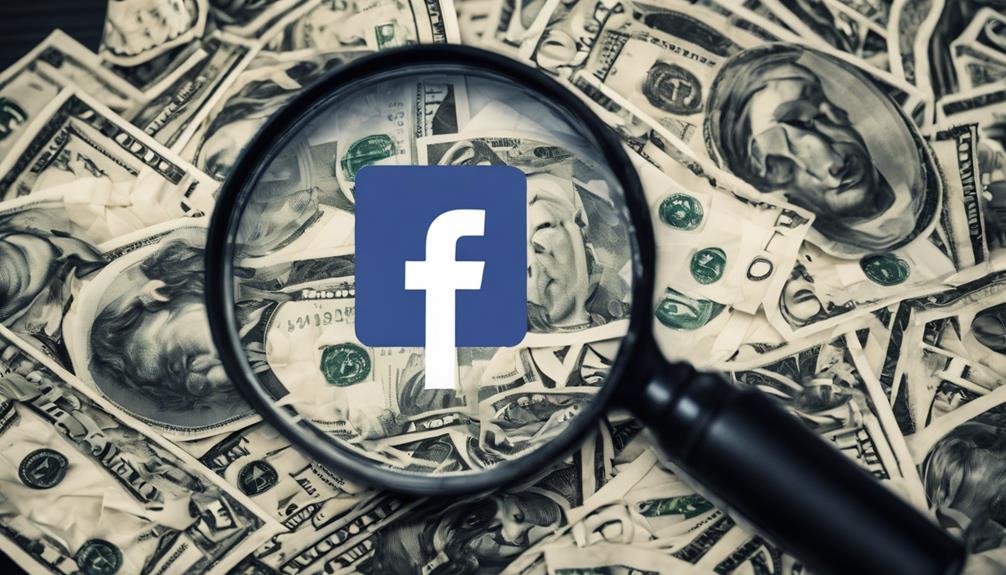
Does Facebook pay per likes?
Imagine a world where every ‘like’ on Facebook is a coin in your pocket. You’re probably wondering if this is just a tantalizing fantasy or a realizable reality.
Does Facebook really pay for likes? It’s a question that’s been swirling around for a while now.
Stay with me, as we unfold the layers of Facebook’s complex monetization policies and decipher the true worth of a ‘like’.
Key Takeaways
- Facebook does not directly pay users for likes, but likes can boost content visibility and engagement.
- The increased visibility from likes can indirectly contribute to revenue through ad impressions and partnerships.
- Users can support creators monetarily through the Facebook Stars functionality, which is not directly dependent on likes.
- Maximizing audience engagement through active participation, live events, and encouraging interactions can increase monetization opportunities on Facebook.
Understanding Facebook’s Monetization Policy

To fully grasp whether Facebook pays per likes, it’s integral to first delve into their complex monetization policy, which governs how users on the platform can earn money. This policy, as you’ll discover, is a well-oiled machine of rules and regulations that Facebook has meticulously designed to maintain a balance between user engagement and revenue generation.
Critical to this policy is the concept of ‘Policy Transparency’. In essence, it’s Facebook’s commitment to being clear about its terms of service, how earnings work, and how content is monetized. It’s the glue that holds the trust between Facebook and its billions of users. With this transparency, you’re not left in the dark about how your interactions on the platform influence your potential earnings.
Equally important is ‘User Privacy’. Facebook assures you that while your likes, shares, and comments can potentially lead to earnings, your personal data remains secure. They’ve set up extensive privacy regulations to ensure that your information isn’t exploited in the process. This delicate balance between privacy and monetization is what makes Facebook’s policy both comprehensive and innovative. Understanding this is key to deciphering how Facebook’s monetization works.
How Facebook Likes Impact Reach
Understanding the impact of Facebook likes on reach is crucial, as each like acts as a catalyst, expanding your content’s visibility to a larger audience and potentially increasing your revenue stream. Facebook’s algorithm influence plays a significant role in determining your content’s reach. You’ve got to comprehend the ways in which likes impact your reach, essentially shaping your social media success.
Likes can:
- Influence the Facebook algorithm, as the platform is designed to favor engaging content, leading to higher visibility.
- Act as a social proof, encouraging more users to engage with your content.
- Increase the likelihood your content will be shown to the liker’s connections, further expanding your reach.
Each like can be seen as an endorsement of your content, making it more likely to appear in other users’ feeds. Thus, the more likes your posts receive, the wider your content spreads, amplifying your reach. Keep in mind, creating truly engaging content is key. It’s not just about quantity but quality. The more appealing your content is, the more likes it’ll attract, ultimately boosting your reach on Facebook.
The Role of Advertisements on Facebook

As you navigate the Facebook landscape, you’ll quickly realize that advertisements play a pivotal role in this social media giant’s ecosystem, not only forging a path for businesses to reach their target audience but also contributing significantly to Facebook’s revenue. Ad targeting effectiveness and user engagement strategies are the two main elements that make this possible.
The effectiveness of ad targeting on Facebook is quite impressive. Businesses can tailor their ads based on user demographics, interests, and behaviors, ensuring that their content reaches the right people. This leads to more relevant ads, increased user engagement, and greater return on investment for businesses.
| Ad Targeting Effectiveness | User Engagement Strategies |
|---|---|
| Tailored ads based on user demographics, interests, behaviors | Utilization of interactive content, personalized messages |
| Ensures content reaches the right people | Encourages users to engage with the brands |
| Leads to increased user engagement and ROI for businesses | Drives more traffic and increases conversions |
User engagement strategies, on the other hand, are essential in attracting and retaining users’ attention. By using interactive content and personalized messages, brands can encourage users to engage with their ads, driving more traffic and increasing conversions. This two-pronged approach is what makes Facebook’s advertising platform so valuable.
Facebook’s Revenue Model Explained
Building on the importance of advertisements in Facebook’s ecosystem, let’s look at how Facebook’s overall revenue model operates. You see, Facebook’s revenue generation isn’t as straightforward as you might think. It’s a complex, multi-faceted model, integrated with strategies tailored to enhance user engagement and navigate data privacy concerns.
Facebook’s revenue model is centered around three core elements:
- Advertisements: This is the primary revenue stream for Facebook. Advertisers pay to display their promotional content to targeted demographics, thereby leveraging Facebook’s extensive user base.
- Data Selling: While Facebook has faced critique and legal issues around data privacy concerns, it’s no secret that user data forms a significant part of their revenue. However, this data is often anonymized and aggregated to maintain user privacy.
- Partnerships & Collaborations: Facebook collaborates with various businesses, providing them tools to reach their audience more effectively.
The key to Facebook’s success is its ability to continually innovate user engagement strategies. They’ve created an interface that encourages users to spend more time on the platform, thereby increasing the effectiveness of advertisements. So, while Facebook doesn’t pay per likes, your likes, shares, and comments are vital to its revenue model.
The Concept of Facebook Stars

While you mightn’t earn any money from a simple ‘like’ on Facebook, the concept of Facebook Stars introduces a whole new paradigm where users can monetize their content. This innovative feature, known as Stars Functionality, enables people to financially support creators they appreciate by sending them Stars.
Each Star translates into a specific monetary value, generating a direct, tangible income for creators. By facilitating a Stars Purchase, Facebook has ingeniously transformed the traditional ‘like’ into a more meaningful and rewarding interaction. Now, your appreciation can be expressed in a way that offers practical support to your favorite content creators, helping them to continue doing what they love.
Let’s delve deeper into this. When you make a Stars Purchase, you’re not only supporting a creator, but you’re also enhancing your engagement with their content. It’s a win-win situation. Creators get paid, and you earn a sense of contribution and enhanced engagement.
Facebook’s Creator Studio Insights
To truly understand how your content performs and how you can maximize your earnings through Facebook Stars, you need to familiarize yourself with Facebook’s Creator Studio Insights. This feature provides a comprehensive overview of your page’s performance, offering valuable insights to tailor your strategy.
The Creator Studio Analytics is a powerful tool. It helps you understand your audience’s behavior, what content they engage with, and what times they’re most active. Interpreting these Page Insights effectively can make all the difference in your content strategy.
Creator Studio Insights offers three critical data sets:
- Audience demographics – telling you who your followers are, their age groups, and geographic locations.
- Content performance – revealing what content resonates with your audience, what falls flat, and why.
- Interaction metrics – detailing when and how your audience interacts with your content.
These insights allow you to fine-tune your approach, ensuring that your content is always hitting the mark. By leveraging this data, you’re not just blindly posting content, you’re strategically sharing content that resonates with your followers, enhancing your chances of earning through Facebook Stars.
Monetizing Your Facebook Page

Having analyzed your audience and optimized your content strategy through Facebook’s Creator Studio Insights, let’s now turn our attention to monetizing your Facebook Page.
Firstly, consider the Page Verification Benefits. A verified page not only enhances your credibility but also prioritizes your content in user’s feeds. This gives your posts an increased chance of organic reach, driving more engagement and potential revenue.
Next, let’s delve into Organic Engagement Tactics. You can monetize your Facebook Page by creating compelling posts that inspire shares, comments, and reactions. Remember, Facebook’s algorithms favor authentic engagement. So, encourage active participation from your followers, not just passive likes. Host live Q&As, create interactive polls, share behind-the-scenes content, or start meaningful discussions. These tactics can dramatically increase your organic reach and engagement, leading to more opportunities for monetization.
Furthermore, explore Facebook’s monetization tools like in-stream ads, fan subscriptions, and branded content. They’re powerful ways to monetize your audience directly and indirectly. However, they require a certain level of followers and engagement. It’s an innovative approach, pushing the boundaries of traditional monetization methods.
The Truth Behind Facebook Likes and Earnings
Let’s debunk the myth: Facebook doesn’t directly pay you for likes on your posts, but they can be instrumental in boosting your potential earnings. Here’s why:
- Algorithm influence: Facebook’s algorithm prioritizes content with high engagement, including likes. If a post receives many likes quickly, it’s likely to be shown to more people, increasing your visibility and potential for income through sponsored posts or ads.
- Like farming practices: Some pages use like farming to artificially boost their likes, but this isn’t a sustainable or ethical strategy. Facebook’s algorithms are becoming increasingly adept at identifying and penalizing such behavior.
- Audience engagement: Likes are a simple way for your audience to interact with your posts. More likes often mean more engagement, which can lead to increased visibility and potential earnings.

